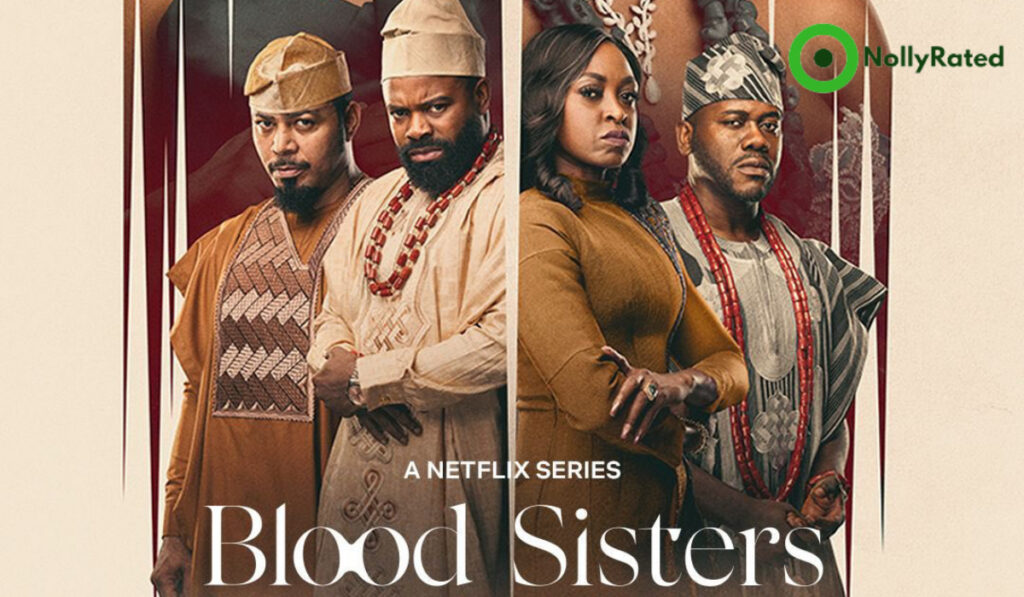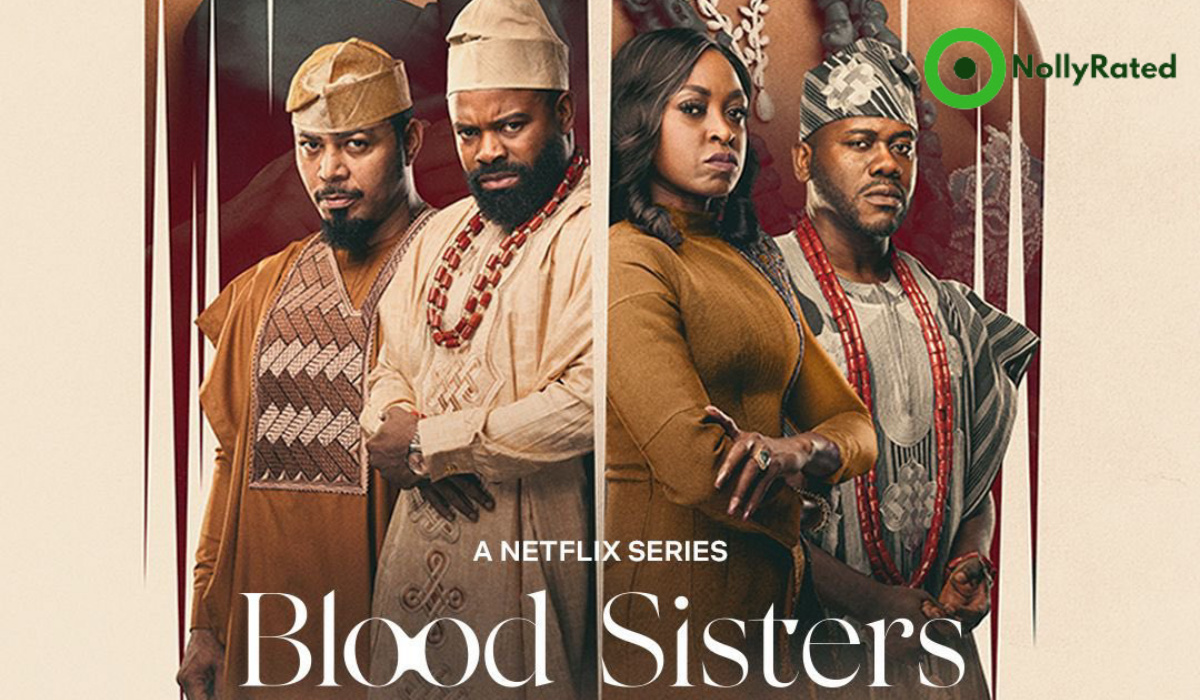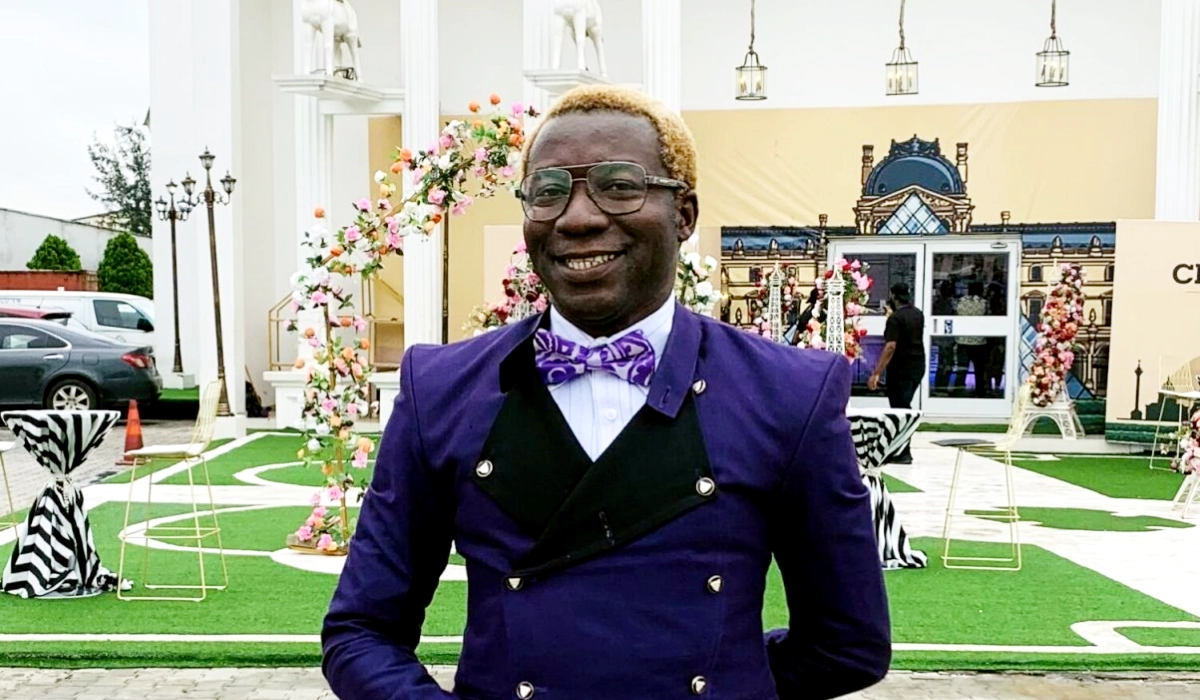I watched Blood Sisters with my family, on Netflix. It is our newly formed tradition to rotationally pick
Movie to Watch Tonight (we don’t call it ‘Movie to Watch Tonight’ abeg, before you think we are an
Americanized family). It was my turn three nights ago.
I cracked my knuckles and said, “Blood Sisters.”
Mum said, waving her hand, “That’s an old film.”
She is more into intense Hollywood and Kollywood thrillers. She says Nigerian entertainment lost it after
the 90s. There are some efforts that intermittently catch her fancy (see KOB, His Excellency, etc.), but
she often finds the plots predictable and the scenes needlessly long. We are also always having to
remind her the names of new-generation Nollywood actors.
I shook my head and said this was not the classic Omotola and Genevieve combo. This was new, and
who knew, she might like it.

My brother set the series in motion. We were eating. Our spoons paused the moment the first scene
broke open. Yeah, that was how arresting it was. My brother, who also has no care for Nollywood
showbiz that has nothing to do with Wizkid and Fireboy, said to me, (Translated from Yoruba) “Are you sure this movie you recommended is Nigerian sha?”
I nodded, eyes on screen. I watched Sarah (Ini Dima-Okojie) fussing in front of a vanity mirror, Kemi
(Nancy Isime) standing behind her, their lines melding and moving the back story outward. I saw the
Power Couple — Yinka (Kehinde Bankole) and Femi (Gabriel Afolayan) — serving us intrigue and sexual
chemistry, and what I expected happened. My mother’s face lit up. She loves Gabriel. Since the days of
Super Story. She sat properly and relaxed.
My dad said, in mixed Yoruba, “It’s so clear.”
I nodded. It suddenly seemed too important to concentrate. Important enough for me to drop my
phone.
“If you are guilty, I’m guilty. Whatever
happens, we are in it together.”
— KEMI
My Appraisal of the movie
My kind of art is not technically-centered. I am all for story, content, MESSAGE. I leave the technical
appraisal (sound, picture, colour arrangement, costume, props) to the experts.
These are what I took (or retook) from the four-episode series (don’t worry, I won’t give too many
spoilers):
�� If your partner influences most or all of your personal choices, in a way that robs you of your ow
natural colour, it’s a SCARLET flag. Don’t wait until they become violent with you first before you bail.
Don’t.
�� Have a second look at art. There may be more to that zest for drawing. Or pattern thereof. As much a
art can be a response to beauty, a statement of aesthetics, it can also serve as a material for anti-human
evil. For example, a very good writer can construct oppressive narratives for external people to gawk at
and imbibe and pass down to other people. Look at our religious books. Have a second, deeper look at
art.
�� If you don’t love your child for any reason, showing this hatred to them or to any of your children i
digging yourself a future grave. Accurately deep and gorgeously befitting for you. Beware.
�� Words kill slower than bullets. But at least, there are chances of recovering from a flesh gunsho
wound. The death from the things people we love and look up to say to us is more fatal and final.
�� Parents, the ONLY say you have in your children’s marriage choices is the question thread: “Are yo
safe here? Are you in love? When you are alone with this person, when we are not there with the
pressures of our presence, how do you feel with this person?”
�� Poverty is not “not having (enough) money”. Poverty is greed. And greed is why we will never d
things right.
�� There is something crazier than friendship. And it’s sisterhood. Blood or not: sisterhood.
�� A parent can look and see what hurts a child, and can either use it or fix it.
�� Religious bigotry is the most efficient tool to exact venom, and the farthest cure for any addiction.
�� One day, that child will break. And you will see what you have been putting inside them.
�� Never trust a stranger’s kindness — even if you are forced to accept it.
�� Never attend your ex’s wedding. Never kid-glove your ex’s shït. Never try to track down your ex all i
the name of ‘keeping them safe’.
�� Blackmailers deserve every roadkill they get.
�� A woman’s survival instinct is not a deadly thing. It is THE MOST DEADLY thing on earth.
�� It’s either you choose the thrills of your marriage, or you choose the truth of your marriage.
�� Loyalty can kill. But at least, it gilds you in honor rather than the sheepish obedience that messes u
your integrity in people’s eyes.
�� A Chicago nose is never wrong.
But for the exaggerated hired kïller scenes and the rather tacky unoriginal simulations of some stunts, I
enjoyed every bit.
No unnecessary comedy. Just jibes, sarcasm and innuendos at our variegated system failures as a
country.
Mightily and maybe showily star-studded, yes, but everybody brought their A game.
And I assert that this is the only Nigerian movie I’ve seen with the highest nudity. I mean, guy, they
showed all the bumbum (see rehab bath fight scene).
Finally, I don’t know why people watch just an episode of a movie and then start concluding about it.
I was scandalized that the first episode had barely been scrutinized before people brought out their
Intelligent Hot Review kit and started smashing holes in the series.
A movie is a movie for a reason. It is not a PDF thesis. Even dissertations unlock more doors for research
in your mind. A movie will not tell you everything. You don’t expect a movie to tell you EVERYTHING. It
takes intelligence. Meet it halfway. See the unrevealed scenes.
LISTEN to the dialogue. People failed to do that with KOB, too. There are things in the dialogue that fill
up the back story.
I am a writer.
A writer keeps a little ‘mystery’.
Even in writing, we are not meant to be TOO OBVIOUS.
Art is for intelligent minds.
Nobody HAS to spell it out to anyone how they got the hotel cleaners’ uniform. It was so late into the
night (the guard said so) and they could have just broken into the uniforms’ locker to steal some.
The lifts were also deserted by that time. So running into people was thin.
The guard himself was only repeating the gist swirling around in the hotel (party guests always have the
real story about the celebrants and their whispers are loud) and he didn’t HAVE TO have known the
groom and the bride personally to have enough to say about them. So why criticize his not recognizing
the bride? What does a guard know about the contours of a bride’s face?
And about how Kemi could be so blöödy for a girl that had never kílled before.
Until you have to cross some borders for the people you love, you won’t know the extent of how crazy,
how plausibly crazy, you are.
Emotional intelligence makes you see the not immediately apparent. From Kemi’s dialogue with Sarah
(Kemi is the most complex character in this movie), you would know that she grew up under strenuous
conditions that internally hardened her. She constantly had to FIGHT her way through life. To make
impulsive, drastic decisions. Tell me again how difficult it could have been for such a character to be
scheming and desperate enough to go bloody.
They had to cut Kola’s head off to make his remains fit into the trunk. Something similar happened in
“Native Son” by Richard Wright. No long story.
We are a pack of intelligent people waiting to hide behind ‘constructive criticism’ and use impeccable
English to tear down people’s work just because they are Nollywood and not Hollywood. And it’s sad.
“Blood Sisters” is a fierce story of childhood love, a sordid year-grown gratitude and justice from
children’s lives to a terrible mother. Written by Temidayo Makanjuola. Produced by Mo Abud of
EbonyLife. Directed by Kenneth Gyang and Biyi Bandele. And they did that trope tight.
“Blood Sisters”, for me, is 8.5/10.



This is the best review I’ve read.
I read it all over again.
Ayo, thanks once more for putting it the way it is.